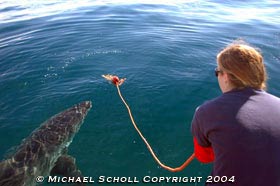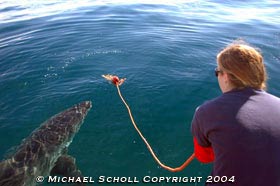 KINGSTON, R.I. — October 19, 2004 — For some, the idea of dangling bait before Jaws sounds less than appealing. But for Jessica Redinger, it was the thrill of a lifetime.
KINGSTON, R.I. — October 19, 2004 — For some, the idea of dangling bait before Jaws sounds less than appealing. But for Jessica Redinger, it was the thrill of a lifetime.
“I’ve been interested in sharks forever, at least since elementary school,” explained the University of Rhode Island senior.
Redinger, a wildlife biology major from Hopkinton, aided in an ongoing shark population study in which a photographic identification database was used to differentiate between individuals and make estimations about the population size and movements of great white sharks. Along with dorsal fin photos, Redinger recorded each individual shark’s length of stay in the area and various physical traits and markings.
“I actually saw a shark breach!” said Redinger of one of the highlights during her month in South Africa. Breaching occurs when the shark leaps completely out of the water, usually only when they are chasing seals. “It went under one side of the boat and leaped out six feet away on the other side,” she said.
Among Redinger’s responsibilities on board was to lure sharks closer to the boat by throwing in a bait line. Redinger recalled holding the bait line and being startled by one apparently very hungry shark pulling the line so hard she nearly fell overboard.
Redinger’s participation in the program was not without obstacles. When she first inquired about studying great whites, the URI faculty had mixed feelings. Some professors strongly encouraged her to pursue studying the sharks, while others were careful not to give false hope.
“Some told me there were so many people who wanted to study them that my chances were pretty slim, but the more they told me I couldn’t, the more determined I became.”
Redinger found the White Shark Trust on the Internet and applied as a sophomore for a research assistant position for a study off Dyer Island, South Africa. Her application was first denied because of the large number of students around the world who were interested, but she kept in touch with the organization and applied a second time on the very day the Trust began accepting applications the following year. Her determination paid off when she gained acceptance into the program with three other students from England, Holland, and France.
Redinger’s research with the White Shark Trust was part of the URI Coastal Fellows Program, a unique program designed to involve undergraduate students in addressing current environmental problems. Now in its ninth year, the Coastal Fellows Program teams students with faculty, research staff, and graduate students to help them gain skills that will ensure their future success.
Redinger will graduate in May and plans to pursue a Master’s in ichthyology and a specialization in great white sharks. She also aims to earn a teaching certification, and hopes to continue research of her own in South Africa.

